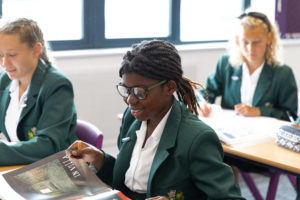Curriculum Intent

MFL at Southend High School for Girls ignites a lifelong love of learning. In MFL we fully cover the range of the National Curriculum and the GCSE and A level specifications. It instils the value of languages as an academic subject and equips students with the emotional resilience and confidence to communicate with spontaneity and increasing levels of grammatical accuracy in a variety of different contexts, using a rich vocabulary. Students begin by giving and understanding information on a personal level and develop the ability to discuss wider international issues, abstract concepts and literature. Our students take opportunities to widen their horizons intellectually, culturally and geographically, liberating themselves from the dangers of insularity. MFL students reflect on and analyse their work. They are not afraid to take responsibility for their learning but set themselves ambitious targets to help them achieve their full potential. They develop the skills required to express themselves and understand both the spoken and the written word to a range of audiences with the aim of being able to access a diversity of authentic literature, film and music. Our ambition is that our students will view themselves as global citizens eager to embrace opportunities and experiences in the world of work and beyond wherever they may be found.
What does it feel like to be a student in the Spanish Department?

Studying Spanish at Southend High School for Girls is a challenging and rewarding experience that will enhance your view of the world and your place in it. In every lesson you will encounter the grammar, structures and vocabulary which will enhance your ability to express your ideas on an abundance of topics in Spanish. You will be fearless and a risk taker in your quest to able to speak coherently and confidently and write creatively and accurately in a wide range of scenarios. You will look beyond the stereotypes and be able to compare and contrast your own language and culture and gain a deeper understanding of Spanish in context. You will process language from a wide variety of sources and translate both ways.
Expectations are high and you will be expected to read widely in order to keep up to date with current events in the Spanish speaking world, stimulate ideas and develop your creative expression. You will have ample opportunities to consolidate your awareness of grammar and acquire a wide ranging and deepening vocabulary, enabling you to take part in discussions about wider issues and aspects of culture.
To complement the course there are several language competitions which are available to all students in all years, including spelling bees, pen pal projects and international competitions such as Education Perfect. In Year 10, you will have the opportunity take part in the pupil exchange with our partner school in Valladolid. Taking part in these activities will enhance your learning and also deepen your awareness of the varied and multicultural landscape the of Spanish language.
If you should leave the subject in Year 9 you will still have the foundations of linguistic competency to be comfortable in a Spanish speaking environment and possess skills of significant benefit for the future. At GCSE you will be in a position to offer a high level of competency to any future employer or institution. In Year 13 and beyond, your command of Spanish will set you apart and give you the tools to become an exceptional candidate for university and employment opportunities beyond the United Kingdom.
Please click on the button below to download the assessment policy for Spanish.
